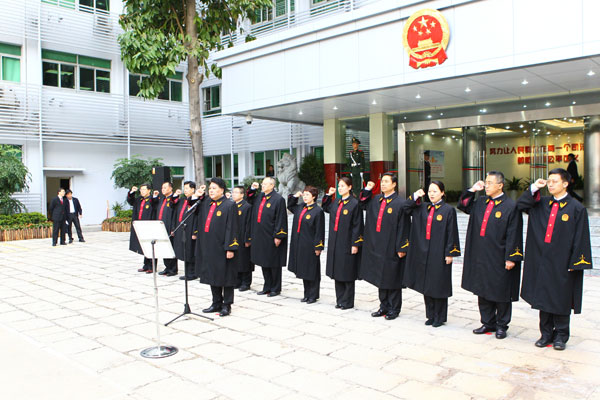Circuit courts ease pressure on system
By Cao Yin (China Daily) Updated: 2015-02-03 08:29
 |
| Judges at China's first circuit court in Shenzhen, Guangdong province, take their oath as it opens on Wednesday. The court's jurisdiction includes Guangdong and Hainan provinces and the Guangxi Zhuang autonomous region. Provided by Xinhua |
East and West are never quite the same. In English, people used to say, "the King has long arms", while in Chinese, people say, "The sky is high, the emperor far away", meaning the government's power diminishes in distant corners of the country.
When you look at all the people lining up every morning in front of some central government offices to file their appeals and submit their complaints, you know how true the ancient saying remains.
Staff members at the Supreme People's Court say that, thanks in part to growing awareness of the rule of law among citizens, they have been overloaded with local appeals for the last few years.
The number of cases that the country's highest court handles annually exceeded 10,000 in 2010 and rose to a record high of 14,000 in 2014.
A majority of the cases are from the economically more developed coastal areas in East China. Now the Supreme People's Court has opened the country's first two circuit courts as its regional extensions, according to a guideline issued on Wednesday.
More convenient service
The move, which will ease the pressure on the top court, is part of judicial reforms designed to prevent local governments from interfering in cases and provide a more convenient service for litigants.
The first circuit court is based in Shenzhen, a business hub adjacent to Hong Kong and a service center for all the other cities in the Pearl River Delta, a key industrial base.
The Shenzhen circuit court is responsible for hearing administrative, civil and commercial disputes in the provinces of Guangdong, of which the Pearl River Delta forms only a part, and Hainan, and the Guangxi Zhuang autonomous region, said Sun Jungong, the top court's spokesman.
The second circuit court is in Shenyang and will serve cases from Heilongjiang, Liaoning and Jilin provinces. It will focus in particular on disputes arising from the painstaking economic transition in the nation's traditional industrial base, Sun said.
The new courts are expected to help relieve the top court from its heavy workload, and ensure independent and unbiased hearings.
However, the Supreme People's Court says cases relating to intellectual property rights, maritime matters, foreigners, executions and claims for State compensation will still be handed by the top court's head office in Beijing.
- Govt encourages people to work 4.5 days a week
- Action to be taken as HIV cases among students rise
- Debate grows over reproductive rights
- Country's first bishop ordained in 3 years
- China builds Tibetan Buddhism academy in Chengdu
- Authorities require reporting of HIV infections at schools
- Typhoon Soudelor kills 14 in East China
- Police crack down on overseas gambling site
- Debate over death penalty for child traffickers goes on
- Beijing to tighten mail security for war anniversary







